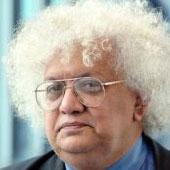American Anger and the Tea Party
A member of Britain’s House of Lords explores the sources of Tea Party anger.
October 15, 2013

The anger and the vehemence of the Tea Party people have an explanation. Average wages have risen hardly at all in the United States in the last 40 years, since the dawn of the oil shock of 1973. Meanwhile, corporate profits have gone up more than handsomely.
A U.S. worker used to be able to finance a good life style for his family working alone in a manufacturing job. With manufacturing having shrunk and the well-paid jobs – if they can be found – now requiring college degrees, the semiskilled manual worker has lost out. Now, it takes two members of the family to work — and borrow on top of that — to sustain the American Dream.
Lots of Americans have lost out. But in terms of expectations, the white working class has lost out most, relative to previous status and position, and plainly resent it.
Curiously, those who have joined Tea Party groups do not blame the market or the big capitalists. Their ideological roots are in free market capitalism. They blame the government which they “know” is the enemy, despite the high proportion of government services and social spending flowing toward poor whites.
While the black and Hispanic working class expect the government to be their friend in need, the white working class does not believe that.
Hence the anger and the frustration. The Tea Party Congressmen, many of them personally well-to-do individuals (like the rest of the U.S. Congress), demand balanced budgets and a cut in debt.
They are the front men of this white working class anger, but not really its friends. The lowering of taxes and cutbacks in the welfare state will mostly benefit their own bank accounts – not those of the white working class they pretend to represent.
Amazingly, these blue-collar folks in the movement that elected these front men do not remember (or, if they do, do not blame) the Republican Presidents – Reagan, Bush Senior and Bush Junior — were the ones who were profligate spenders, gave away tax cuts to the rich and pursued adventures abroad.
Republicans piled on the debt that the Tea Party congressmen now seek to pay off by cutbacks to the very services their constituents depend on.
It was President Bill Clinton, a Democrat, who balanced the Budget in the last years of his presidency. Apart from that episode, the U.S. Budget has not been in balance since the days when Eisenhower was President.
Rather than recognize the party that has most recently helped them or the macroeconomic trends that have hurt them, the economic anger of the Tea Party has been displaced. It has been redirected against Obama, more out of a certain amount of racist hatred for a mixed-race President (recall the unending controversy over his birth certificate) than merely against Washington’s Big Government.
Takeaways
The anger of the Tea Party has an explanation: wages have stalled as corporate profits have risen since the 1970s.
Instead of directing anger at the true forces at work, the Tea Party has named Big Government and Obama its enemy.
While the black and Hispanic working class view government as a friend, the white working class does not.
The Tea Party forgets that Republicans were the spenders, who gave tax cuts to the rich and launched wars abroad.

